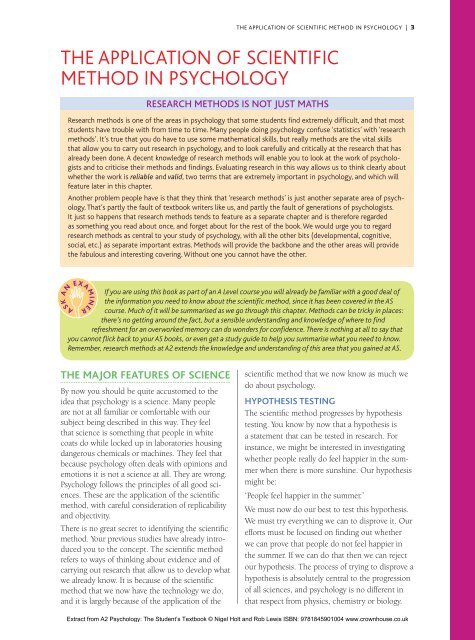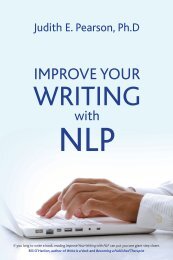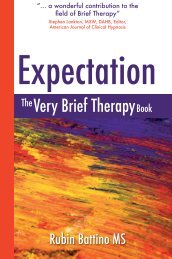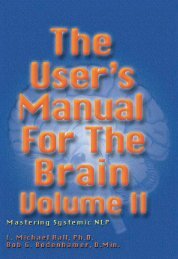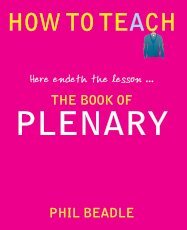Nigel Holt and Rob Lewis - Crown House Publishing.
Nigel Holt and Rob Lewis - Crown House Publishing.
Nigel Holt and Rob Lewis - Crown House Publishing.
You also want an ePaper? Increase the reach of your titles
YUMPU automatically turns print PDFs into web optimized ePapers that Google loves.
the application of scientific mETHOD in PSYCHOLOGY | 3THE APPLICATION OF SCIENTIFICMETHOD IN PSYCHOLOGYResearch methods is not just mathsResearch methods is one of the areas in psychology that some students find extremely difficult, <strong>and</strong> that moststudents have trouble with from time to time. Many people doing psychology confuse ‘statistics’ with ‘researchmethods’. It’s true that you do have to use some mathematical skills, but really methods are the vital skillsthat allow you to carry out research in psychology, <strong>and</strong> to look carefully <strong>and</strong> critically at the research that hasalready been done. A decent knowledge of research methods will enable you to look at the work of psychologists<strong>and</strong> to criticise their methods <strong>and</strong> findings. Evaluating research in this way allows us to think clearly aboutwhether the work is reliable <strong>and</strong> valid, two terms that are extremely important in psychology, <strong>and</strong> which willfeature later in this chapter.Another problem people have is that they think that ‘research methods’ is just another separate area of psychology.That’s partly the fault of textbook writers like us, <strong>and</strong> partly the fault of generations of psychologists.It just so happens that research methods tends to feature as a separate chapter <strong>and</strong> is therefore regardedas something you read about once, <strong>and</strong> forget about for the rest of the book. We would urge you to regardresearch methods as central to your study of psychology, with all the other bits (developmental, cognitive,social, etc.) as separate important extras. Methods will provide the backbone <strong>and</strong> the other areas will providethe fabulous <strong>and</strong> interesting covering. Without one you cannot have the other.If you are using this book as part of an A Level course you will already be familiar with a good deal ofthe information you need to know about the scientific method, since it has been covered in the AScourse. Much of it will be summarised as we go through this chapter. Methods can be tricky in places:there’s no getting around the fact, but a sensible underst<strong>and</strong>ing <strong>and</strong> knowledge of where to findrefreshment for an overworked memory can do wonders for confidence. There is nothing at all to say thatyou cannot flick back to your AS books, or even get a study guide to help you summarise what you need to know.Remember, research methods at A2 extends the knowledge <strong>and</strong> underst<strong>and</strong>ing of this area that you gained at AS.The major features of scienceBy now you should be quite accustomed to theidea that psychology is a science. Many peopleare not at all familiar or comfortable with oursubject being described in this way. They feelthat science is something that people in whitecoats do while locked up in laboratories housingdangerous chemicals or machines. They feel thatbecause psychology often deals with opinions <strong>and</strong>emotions it is not a science at all. They are wrong.Psychology follows the principles of all good sciences.These are the application of the scientificmethod, with careful consideration of replicability<strong>and</strong> objectivity.There is no great secret to identifying the scientificmethod. Your previous studies have already introducedyou to the concept. The scientific methodrefers to ways of thinking about evidence <strong>and</strong> ofcarrying out research that allow us to develop whatwe already know. It is because of the scientificmethod that we now have the technology we do,<strong>and</strong> it is largely because of the application of thescientific method that we now know as much wedo about psychology.Hypothesis TestingThe scientific method progresses by hypothesistesting. You know by now that a hypothesis isa statement that can be tested in research. Forinstance, we might be interested in investigatingwhether people really do feel happier in the summerwhen there is more sunshine. Our hypothesismight be:‘People feel happier in the summer.’We must now do our best to test this hypothesis.We must try everything we can to disprove it. Ourefforts must be focused on finding out whetherwe can prove that people do not feel happier inthe summer. If we can do that then we can rejectour hypothesis. The process of trying to disprove ahypothesis is absolutely central to the progressionof all sciences, <strong>and</strong> psychology is no different inthat respect from physics, chemistry or biology.Extract from A2 Psychology: The Student’s Textbook © <strong>Nigel</strong> <strong>Holt</strong> <strong>and</strong> <strong>Rob</strong> <strong>Lewis</strong> ISBN: 9781845901004 www.crownhouse.co.uk


